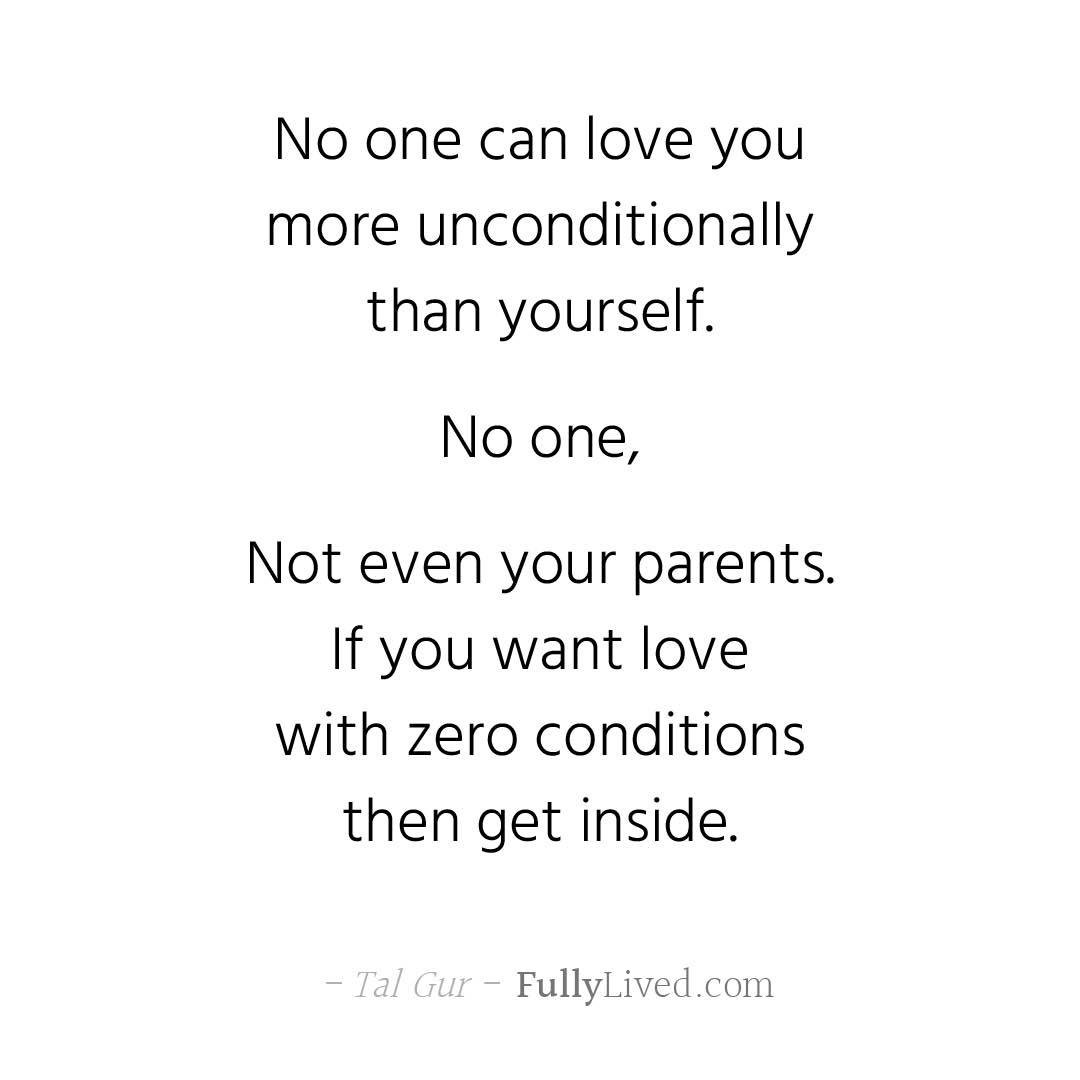No one can love you more unconditionally than yourself. No one, Not even your parents. If you want love with zero conditions then get inside.
This quote speaks to the profound truth of self-love, and the essence of looking inward to find the most abundant and unconditional source of affection. The concept here is not that your parents, or anyone else for that matter, love you any less, but rather it's an exploration of the unique position you have to understand and appreciate yourself in ways others cannot. You are privy to your thoughts, your struggles, your victories, your dreams, and your fears in a manner that no one else can fully grasp. You are the sole inhabitant of your mind, the only one who truly experiences your reality. This intimate knowledge of self allows you to love yourself without conditions because you can understand, forgive, and accept your own imperfections in a way that others might not be able to. It's a call to delve into the depths of your own being, to cultivate an awareness and acceptance of yourself that transcends external validation. It's about realizing that your capacity for self-love is limitless, undying, and completely within your control. It encourages you to put yourself first, to understand that it is not selfish but essential, for it forms the foundation for all other love that exists in your life. This quote is a reminder that the journey to unconditional love begins and ends within oneself.
Additionally, the quote is a powerful prompt towards self-realization and introspection. It speaks to the idea that the love you seek externally, the kind that comes with no conditions, is already within you. Often, we go about our lives seeking validation, appreciation, and love from the external world, we forget that the most potent and unconditional form of love is already within us. This quote asks you to turn your gaze inward, to discover and nurture the wellspring of love that exists within your own heart. It’s a profound reminder that while external love can be conditional, fluctuating, and sometimes fleeting, the love you have for yourself is steadfast, enduring, and free from conditions. It also underscores the truth that we are often our own harshest critics. We impose conditions on our own self-love, which we wouldn't dream of imposing on others. We tell ourselves we need to be better, to achieve more, to be more perfect before we are worthy of love. This quote is an invitation to challenge these self-imposed conditions, to strip them away and uncover the unconditional love that lies beneath. It's an appeal to step inside your own heart, to embrace yourself as you are, and to understand that you are inherently worthy of love, just as you are. This is the kind of love that can sustain you, that can heal you, and that can empower you to love others with the same depth and unconditionality.
Is there a historical example that illustrates the message of the quote?
A historical example that illustrates the message behind the quote can be seen in the life of the renowned artist Vincent Van Gogh. Van Gogh, known for his beautiful and emotive works, is also famous for his struggles with mental health and his ultimate tragic end. Throughout his life, he faced numerous hardships, including professional failures, romantic rejections, and a lack of recognition for his art during his lifetime. Even though he was supported by his brother Theo, the outside world largely misunderstood and rejected him.
However, Van Gogh found solace, understanding, and indeed a form of unconditional love in his own self, which he expressed through his art. Despite the lack of recognition and constant criticism, he continued to paint because he found profound meaning and fulfillment in it. His love for his craft and his belief in his own vision was unwavering, even when faced with immense external negativity. This was a form of self-love that was completely unconditional, not reliant on the validation of others.
Van Gogh's story is a poignant example of the quote's message. It reminds us of the importance of understanding and loving ourselves unconditionally, of finding our own intrinsic worth regardless of external circumstances. It shows us that even when we face rejection or misunderstanding from the outside world, we can find an enduring source of love within ourselves. Van Gogh's art, which was the manifestation of his unconditional self-love, continues to inspire and touch people even today, long after his passing. His story serves as a powerful testament to the strength of self-love and its enduring impact.
* If you're looking for more inspiration to help you on your personal development journey, you may want to check out my extensive list of SMART goals. This page is packed with thousands of different goal ideas that can help you set new aspirations and reach higher heights in your life. Personally, this page helped me to create my own 100 life goals list, which I pursued for over a decade.
Chief Editor
 Tal Gur is an author, founder, and impact-driven entrepreneur at heart. After trading his daily grind for a life of his own daring design, he spent a decade pursuing 100 major life goals around the globe. His journey and most recent book, The Art of Fully Living, has led him to found Elevate Society.
Tal Gur is an author, founder, and impact-driven entrepreneur at heart. After trading his daily grind for a life of his own daring design, he spent a decade pursuing 100 major life goals around the globe. His journey and most recent book, The Art of Fully Living, has led him to found Elevate Society.






















